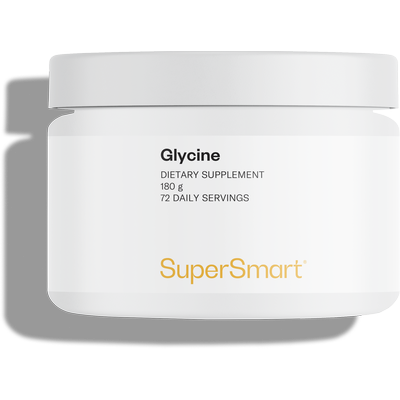What are the benefits of glycine for the body?
A discreet but important amino acid, glycine plays a key role in many of the body's functions and offers numerous benefits. What if well-targeted supplementation could boost some of its natural effects?

Glycine, an amino acid produced by the body
Glycine is a non-essential amino acid: it can be produced naturally by our bodies, unlike the so-called ‘essential’ amino acids, which must be supplied by the diet.
Glycine is synthesised from other compounds (such as serine) in the liver, kidneys and brain. It is also found in certain protein-rich foods, particularly animal products such as meat, bone broth, fish and gelatine.
Despite its chemical simplicity – it is the smallest of the amino acids – glycine is involved in a number of physiological processes, in particular those linked to the immune system, the nervous system and detoxification.
Although the body is able to produce glycine, its endogenous supply does not always cover all its needs. Glycine production also declines sharply with age... hence the importance of precisely targeting external intake of this amino acid.
What are the natural physiological functions of glycine?
Discreet but versatile, glycine is naturally produced by the body and acts on several levels.
Collagen synthesis
Glycine represents around a third of the amino acids present in collagen, the main structural protein in the skin, tendons, ligaments and cartilage.
It plays an active role in the formation and stability of collagen fibres (1), which are essential for tissue strength and elasticity.
This structural role explains why glycine is often promoted for its benefits to skin, hair and nails, as well as to joints and bone health.
Neurotransmission
Glycine also acts as an inhibitory neurotransmitter in the central nervous system.
It moderates neuronal activity, contributing to a balance between excitation and relaxation of the nervous system.
This mechanism partly explains why glycine may be associated with calming effects or contribute to better sleep quality (2).
Liver support and detoxification
Glycine is involved in the synthesis of glutathione, one of the body's major antioxidants.
Glutathione plays a crucial role in liver detoxification and cell protection against free radicals (3).
By participating in this process, glycine indirectly contributes to the proper functioning of the liver and the neutralisation of toxic substances from metabolism and the environment.
Immune modulation and antioxidant effect
A number of studies suggest that glycine may play a role in regulating inflammatory responses and the proper functioning of the immune system, in particular by acting on certain pro-inflammatory cytokines (4).
It also appears to be involved in protection against oxidative stress, thanks to its role in the synthesis of glutathione and other key compounds in cellular metabolism.
What are the potential benefits of glycine supplementation?
Although glycine is produced by the body, a great deal of research is looking into the potential impact of targeted supplementation (5).
Deep, restorative sleep
Several studies suggest that taking glycine before bed may help you fall asleep more quickly, improve the quality of deep sleep and reduce the feeling of tiredness when you wake up (6).
It is thought to act by slightly lowering core body temperature (a natural phenomenon that precedes sleep onset) and by modulating the activity of the parasympathetic nervous system.
These potential effects make it a gentle alternative to sedative drugs for people looking for natural sleep support.
Support for muscle recovery
The benefits of glycine supplementation are often mentioned in bodybuilding, particularly in terms of speeding up recovery after exercise and promoting the regeneration of muscle and connective tissue.
Its role in the synthesis of collagen and structural proteins makes it a strategic amino acid for regular physical activity.
Combined with a healthy lifestyle, glycine could help to reduce joint pain, improve tissue flexibility and support long-term physical performance (7).
Digestion and intestinal health
Supplementing with glycine could also support digestive health, thanks to its role in the production of digestive enzymes and the regulation of intestinal inflammation.
Some research indicates a potential impact on intestinal permeability, with better protection of the mucosa (8).
Glycine supplementation could therefore be of interest to people prone to functional intestinal disorders, among others.
Metabolic support and weight management
Glycine is also being studied for its possible effects on the assimilation of sugars and fats.
Some studies have reported improved insulin sensitivity and better glycaemic control following glycine supplementation, two key factors in the prevention of obesity (9).
It could therefore form part of an overall weight management strategy, although these results still need to be treated with caution.
Cellular ageing and skin health
Glycine is involved in collagen synthesis and may contribute to antioxidant defences, so it could play an interesting role in preventing skin aging and improving skin firmness and hair vitality.
Its indirect action on liver detoxification and cell repair reinforces this perspective. Supplementing with glycine could therefore support the body during episodes of chronic fatigue or oxidative stress.
How do you supplement with glycine?
Glycine is currently available as a dietary supplement in powder, capsule or tablet form.
![]() Discover the Glycine powder dietary supplement, which provides an optimal intake of 2.5g of glycine per day.
Discover the Glycine powder dietary supplement, which provides an optimal intake of 2.5g of glycine per day.
To get the maximum benefits, it is advisable to follow the dosage indicated on the products and to seek advice from a health professional if you have a medical condition or are taking medication.
While research is increasingly exploring the benefits of glycine supplementation (particularly in terms of sleep, muscle recovery, digestion and skin), it should complement a healthy, balanced lifestyle.
SUPERSMART ADVICE
References
- Li P, Wu G. Roles of dietary glycine, proline, and hydroxyproline in collagen synthesis and animal growth. Amino Acids. 2018 Jan;50(1):29-38. doi: 10.1007/s00726-017-2490-6. Epub 2017 Sep 20. PMID: 28929384.
- Bannai M, Kawai N. New therapeutic strategy for amino acid medicine: glycine improves the quality of sleep. J Pharmacol Sci. 2012;118(2):145-8. doi: 10.1254/jphs.11r04fm. Epub 2012 Jan 27. PMID: 22293292.
- Razak MA, Begum PS, Viswanath B, Rajagopal S. Multifarious Beneficial Effect of Nonessential Amino Acid, Glycine: A Review. Oxid Med Cell Longev. 2017;2017:1716701. doi: 10.1155/2017/1716701. Epub 2017 Mar 1. Erratum in: Oxid Med Cell Longev. 2022 Feb 23;2022:9857645. doi: 10.1155/2022/9857645. PMID: 28337245; PMCID: PMC5350494.
- Aguayo-Cerón KA, Sánchez-Muñoz F, Gutierrez-Rojas RA, Acevedo-Villavicencio LN, Flores-Zarate AV, Huang F, Giacoman-Martinez A, Villafaña S, Romero-Nava R. Glycine: The Smallest Anti-Inflammatory Micronutrient. Int J Mol Sci. 2023 Jul 8;24(14):11236. doi: 10.3390/ijms241411236. PMID: 37510995; PMCID: PMC10379184.
- Kumar P, Liu C, Suliburk J, Hsu JW, Muthupillai R, Jahoor F, Minard CG, Taffet GE, Sekhar RV. Supplementing Glycine and N-Acetylcysteine (GlyNAC) in Older Adults Improves Glutathione Deficiency, Oxidative Stress, Mitochondrial Dysfunction, Inflammation, Physical Function, and Aging Hallmarks: A Randomized Clinical Trial. J Gerontol A Biol Sci Med Sci. 2023 Jan 26;78(1):75-89. doi: 10.1093/gerona/glac135. PMID: 35975308; PMCID: PMC9879756.
- Thomas C, Kingshott RN, Allott KM, Tang JCY, Dunn R, Fraser WD, Thorley J, Virgilio N, Prawitt J, Hogervorst E, Škarabot J, Clifford T. Collagen peptide supplementation before bedtime reduces sleep fragmentation and improves cognitive function in physically active males with sleep complaints. Eur J Nutr. 2024 Feb;63(1):323-335. doi: 10.1007/s00394-023-03267-w. Epub 2023 Oct 24. PMID: 37874350; PMCID: PMC10799148.
- Ramos-Jiménez A, Hernández-Torres RP, Hernández-Ontiveros DA, Ortiz-Ortiz M, López-Fregoso RJ, Martínez-Sanz JM, Rodríguez-Uribe G, Hernández-Lepe MA. An Update of the Promise of Glycine Supplementation for Enhancing Physical Performance and Recovery. Sports (Basel). 2024 Sep 25;12(10):265. doi: 10.3390/sports12100265. PMID: 39453231; PMCID: PMC11510825.
- Yang Y, Fan X, Ji Y, Li J, Dai Z, Wu Z. Glycine represses endoplasmic reticulum stress-related apoptosis and improves intestinal barrier by activating mammalian target of rapamycin complex 1 signaling. Anim Nutr. 2022 Mar;8(1):1-9. doi: 10.1016/j.aninu.2021.05.004. Epub 2021 Sep 15. PMID: 34977370; PMCID: PMC8669258.
- Adeva-Andany M, Souto-Adeva G, Ameneiros-Rodríguez E, Fernández-Fernández C, Donapetry-García C, Domínguez-Montero A. Insulin resistance and glycine metabolism in humans. Amino Acids. 2018 Jan;50(1):11-27. doi: 10.1007/s00726-017-2508-0. Epub 2017 Nov 1. PMID: 29094215.
4 Days
very good expereince
very good expereince
Jelena Đaković
4 Days
Very good products.
Very good products.
Agnes BENDSAK
6 Days
Just OK
Just OK, ordering from company for many years and being safisfied
Lynn Mae
7 Days
Recomendo
Produtos encomendados são recebidos atempadamente e de acordo com o anunciado! Muito satisfeita!
Carla Sofia
7 Days
Everything is great!
Everything is great!
Jonas
12 Days
The delivery was fast and the product…
The delivery was fast and the product is great
SOMMARIVA Gianni
13 Days
Great service and lots of information
Great service and lots of information
Gabi
16 Days
Service Satisfaction
I’m satisfied with the service; it fulfilled what it set out to do.
Anfhony Abreu
19 Days
Original product and fast delivery
Original product and fast delivery. I haven't started it yet, but will do soon.
Vincenza Catania
22 Days
Good quality
Good quality. Good service.
Leonel Guzman
24 Days
Top!!!!!!!!
Top!!!!!!!!
Michael
26 Days
Excellent!
Products are great and delivered fast!
PARDINI Debora
27 Days
From order to receive the product
From order to receive the product, the process is smooth & fast. It’s good to customers.
WONG Mei Ling
28 Days
Fast delivery
very quick delivery to italy. product is good.
Customer
29 Days
Prompt delivry !!👍
Prompt delivry !!👍
SWEET Christine
of experience
your money back
##montant## purchase





